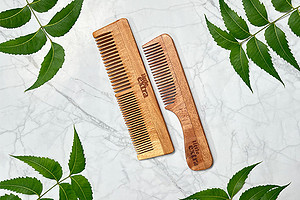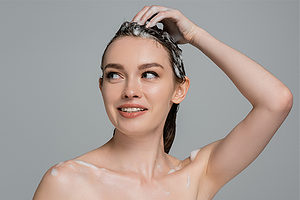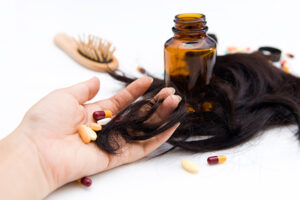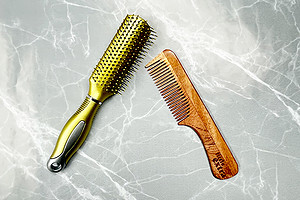Your hair is an essential part of your appearance and should be maintained accordingly.
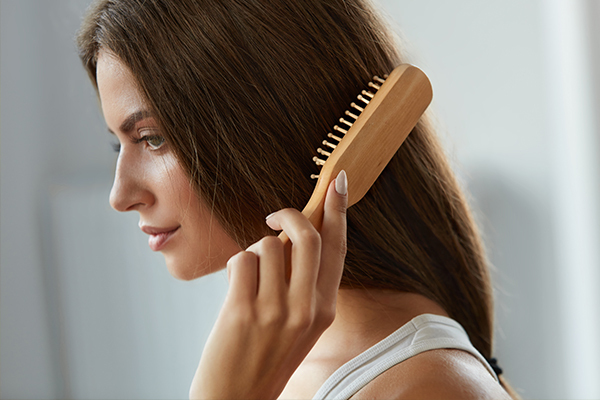
Unfortunately, hair loss is a major problem affecting nearly one-third of the population today.
Although different people require different treatments for this condition, a few remedies can help with hair growth universally, and collagen supplements are the new talk of the town. A study has shown that this protein can indirectly increase hair growth. (1)
Article Contents
What Is Collagen, and What Are Collagen Supplements?
Collagen refers to a group of proteins found in the body that provide structural support and elasticity to the bones, muscles, and skin tissues.
Collagen supplements mostly contain collagen peptides – a smaller, easier-to-absorb form of collagen. They can be consumed orally in the form of pills, tablets, or powders. (2)
Scientific Evidence of Collagen for Hair Thickness
Collagen supplements for hair growth are mostly obtained from two sources – bovine (from cows) and marine (from fish).
Multiple studies have shown the efficacy of marine collagen supplements in increasing hair growth and fighting hair loss. (3)(4) Moreover, several studies published in reputed journals have demonstrated the benefits of taking collagen supplements for hair growth.
In a recent double-blind study, healthy adults were supplemented with 14 g of gelatin (collagen supplement) every day. After a few months, their hair strength and thickness had improved significantly. Interestingly, after a few months of stopping gelatin, their hair went back to its original state. (4)
In another study, marine collagen supplements were given to men suffering from hair loss and thinning. Within 6 months, significant hair growth had occurred in many subjects and hair loss had decreased. (5)
Benefits of Collagen for Hair
Collagen supplements are most commonly found in the form of hydrolyzed collagen peptides as these molecules are easier to absorb. Collagen peptides do not increase hair growth per se, but they do improve the general health and strength of the hair follicles. (2)
Hair is mostly made up of a protein called “keratin.” Keratin and collagen are both made of amino acids.
When you consume collagen via supplements or diet, it is broken down into its constituent amino acids, which are distributed throughout the body. Hence, these amino acids help make keratin for the hair.
According to a study published in the Journal of Clinical and Aesthetic Dermatology, collagen supplements can help increase hair growth and thickness in women suffering from hair loss and thinning. (6)(7)
Here are other ways collagen can support hair and scalp health.
1. May help maintain a healthy scalp
Collagen is a major structural component of the skin and hair. It helps make your hair thick and strong. Hence, collagen can play a major role in improving the quality of your scalp and hair. (8)
2. Provides essential compounds for hair growth
Collagen is made up of amino acids including proline. These amino acids when distributed throughout the body can help make keratin, an essential protein, for your hair.
Thus, collagen peptides can help increase the levels of keratin to repair damaged hair and also induce hair growth. (9)(10)
3. Supports hair follicle health and regeneration
Collagen is found in the hair follicle in the dermal layers. Consuming collagen via your diet helps increase the rate of hair growth by replenishing the collagen lost during the hair growth cycle.
How to Use Collagen for Hair
Collagen is the most plentiful protein in your body, and nowadays there is growing popularity of collagen-containing products.
Although collagen for topical application is gaining new traction in the market recently, collagen is best taken orally via your diet or supplements. Collagen molecules are too large to pass through the dermal barriers of the scalp.
Current collagen supplements get around the issue by hydrolyzing collagen into collagen peptides, which are much smaller strings of the amino acids that make up collagen. These shorter chains are more readily absorbed and can be made into powders or packaged into pills to be taken orally.
Natural Sources of Collagen

Consuming a diet rich in collagen may help increase your hair growth and strength.
However, no scientific evidence has shown that collagen consumed through the diet improves hair growth. This is because collagen is broken down in your stomach into its constituent amino acids, which are then distributed all over the body.
Yet, anecdotal evidence for it is plenty. Thus, there is no harm in improving your diet to include more collagen-rich foods such as:
- Vitamin C-rich foods such as citrus fruits, avocadoes, guavas, spinach, etc. Vitamin C helps in the production of collagen in the body.
- Foods rich in sulfur such as cruciferous vegetables including cauliflower and broccoli
- Nuts and whole grains
- Seafood (salmon, shellfish, etc.), eggs, and organ meat
- Bone soups (11)
Factors Affecting Collagen Production
Here are a few factors that may contribute to decreased collagen levels in the body:
- Age: As you grow older, your body tends to produce lesser amounts of collagen.
- Menopause: Most women’s bodies tend to decrease collagen production in the first few years of menopause. (12)(13)
Do Collagen Supplements Work?

Collagen supplements may increase hair growth on your scalp, and several research studies have proven it. However, scientists are still unsure how collagen contributes to hair growth and whether it is useful to consume.
Collagen supplements are safe to consume and there shouldn’t be any harm in trying them. Nevertheless, make sure to buy them from a trustworthy brand or source as collagen is not regulated by the FDA.
What You Should Know
There are two types of collagen supplements based on their source:
- Marine collagen: sourced from fish.
- Bovine collagen: sourced mostly from cows, pigs (porcine), and rarely chicken.
Recently, plant-based collagen has been making waves in the beauty industry. However, plants do not contain collagen, and what these products do is help increase collagen production in your own body by supplementing vitamins and other ingredients.
Side Effects
Collagen has very few side effects as it is a completely natural ingredient.
However, some people may experience allergic reactions and even anaphylactic shock from collagen supplements. This is more common with marine collagen supplements.
Always make sure to check the source of your collagen and whether you are allergic to it before consumption.
General Queries About Collagen for Hair
What are collagen peptides?
Collagen peptides are smaller, broken-down forms of collagen that can be easily absorbed into the bloodstream.
Which type of collagen is best for hair?
Type I collagen is the most abundant collagen found in the body. It helps in the formation of body tissues such as bones and skin. Marine collagen supplements contain type I collagen.
Final Word
Collagen is a major protein that helps build body tissues. It provides structural support and strength to the muscular and skeletal systems.
While collagen may not directly contribute to hair growth, plenty of scientific evidence shows that consuming collagen does help increase hair thickness and strength. You can increase your collagen intake by eating more collagen-rich foods or taking collagen supplements.
References
- Araújo LAde, Addor F, Campos PMBGM. Use of silicon for skin and hair care: An approach of chemical forms available and efficacy. Anais brasileiros de dermatologia. https://www.ncbi.nlm.nih.gov/pmc/articles/PMC4938278/. Published 2016.
- León-López A, Morales-Peñaloza A, Martínez-Juárez VM, Vargas-Torres A, Zeugolis DI, Aguirre-Álvarez G. Hydrolyzed collagen-sources and applications. Molecules (Basel, Switzerland). https://www.ncbi.nlm.nih.gov/pmc/articles/PMC6891674/. Published November 7, 2019.
- Glynis A. A double-blind, placebo-controlled study evaluating the efficacy of an oral supplement in women with self-perceived thinning hair. The Journal of clinical and aesthetic dermatology. https://www.ncbi.nlm.nih.gov/pmc/articles/PMC3509882/. Published November 2012.
- G; A. A 3-month, randomized, double-blind, placebo-controlled study evaluating the ability of an extra-strength marine protein supplement to promote hair growth and decrease shedding in women with self-perceived thinning hair. Dermatology research and practice. https://pubmed.ncbi.nlm.nih.gov/25883641/.
- G; A. A 6-month, randomized, double-blind, placebo-controlled study evaluating the ability of a marine complex supplement to promote hair growth in men with thinning hair. Journal of cosmetic dermatology. https://pubmed.ncbi.nlm.nih.gov/27506633/.
- Nutraceuticals for androgenetic alopecia. JCAD The Journal of Clinical and Aesthetic Dermatology. https://jcadonline.com/nutraceuticals-for-androgenetic-alopecia/. Published March 1, 2022.
- Ji S, Zhu Z, Sun X, Fu X. Functional hair follicle regeneration: An updated review. Nature News. https://www.nature.com/articles/s41392-020-00441-y. Published February 17, 2021.
- Balañá ME, Charreau HE, Leirós GJ. Epidermal stem cells and skin tissue engineering in hair follicle regeneration. World journal of stem cells. https://www.ncbi.nlm.nih.gov/pmc/articles/PMC4444612/. Published May 26, 2015.
- Feroz S, Muhammad N, Ranayake J, Dias G. Keratin – based materials for biomedical applications. Bioactive materials. https://www.ncbi.nlm.nih.gov/pmc/articles/PMC7171262/. Published April 16, 2020.
- Li Q, Uygun BE, Geerts S, et al. Proteomic analysis of naturally-sourced biological scaffolds. Biomaterials. https://www.sciencedirect.com/science/article/abs/pii/S0142961215008157. Published October 8, 2015.
- LM; ARDSGCB. Bone broth unlikely to provide reliable concentrations of collagen precursors compared with supplemental sources of collagen used in collagen research. International journal of sport nutrition and exercise metabolism. https://pubmed.ncbi.nlm.nih.gov/29893587/.
- Thornton MJ. Estrogens and aging skin. Dermato-endocrinology. https://www.ncbi.nlm.nih.gov/pmc/articles/PMC3772914/. Published April 1, 2013.
- Perez-Sanchez AC, Burns EK, Perez VM, Tantry EK, Prabhu S, Katta R. Safety concerns of skin, hair and nail supplements in retail stores. Cureus. https://www.ncbi.nlm.nih.gov/pmc/articles/PMC7455464/. Published July 30, 2020.



